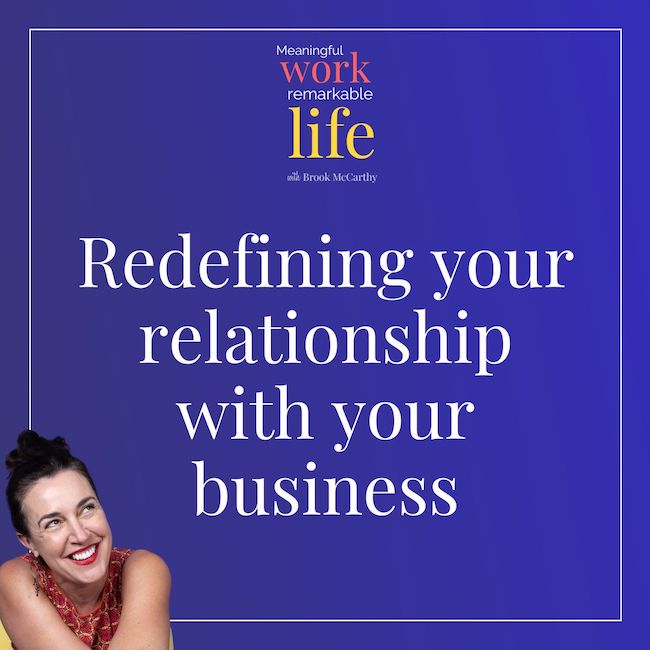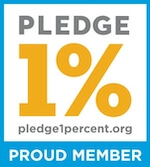
Episode 11: Redefining your relationship with your business
Many of us have a complicated relationship with our business. Sometimes, this is an abusive relationship – where we give everything, and get very little in return.
If you’re feeling burnt out, anxious, or overwhelmed by constantly thinking about your business, even when you’re trying to relax, then this episode is for you.
We discuss:
- Creating healthy business boundaries
- Finding a new approach to people pleasing
- ‘If you love what you do, you’ll never work another day in your life’ bullshit
- The dopamine hits of business
- When your values are weaponised against you
- Divorcing your self-worth from your productivity.

Transcript
Welcome to Meaningful Work Remarkable Life. I’m your host, Brook McCarthy, and I’m a business coach, trainer and speaker living and working on the unceded lands of the Cameragal people here in Sydney, Australia. In this podcast, we explore the paradoxes inherent in working for love and money, magnifying your impact, and doing the work you feel born to do, we explore the intersections of the meanings we bring to work, and the meanings we derive from work.
Hello, This is Brook McCarthy and today we are going to be talking about the relationship between ourselves and our businesses. Now this is a pertinent topic for me right now, because I am six weeks from leaving to go overseas for six weeks, I’m going to Italy and England with friends and family. And so this is something that’s on my mind is, you know, the kind of key question that we’re exploring today, what would my business, what would your business need to keep running smoothly to keep earning income in order to have a smooth and enjoyable time away.
And I know it’s possible, I’ve done it before. I’ve helped clients do it, I had a one to one coaching client recently, who had a number of massive life events in quick succession, some happy some sad that necessitated her leaving her business for good chunk of time. And some of it was planned. And some of it was unplanned. And it kind of came thick and fast. And for weeks and weeks and weeks she was away and working at you know, a much reduced capacity.
And yet, her clients continued to be serviced. Money continued to be made, and everything went pretty smoothly. So this is the key question that we’re exploring today. How is it possible to redefine our relationship and to create a bit of space between ourselves and our business?
So let’s get right into it with the big question that I’m sure you’re wondering about. I am certain of it is your identity as a insert your professional newer, yeah, whatever it is that you do whatever it is that you call yourself, whatever it is that you are happy, and proud and excited to call yourself, whether that’s loudly proud or quietly proud, the you know, the meaning that you derive from your profession. And some of us, you know, love being business owners. Some of us don’t love that so much.
But, you know, it’s kind of like an necessity to enable us to do what we love is to, in fact, be a business owner. But this meaning that we derive can become a liability when it comes to creating bit of space between ourselves and our businesses and to being able to take time off.
And, you know, the second point that goes along with this, which I think needs to be talked about a lot more, because it’s not really clearly discussed. And I think we all feel this is the dopamine hit, right? That people pleasing, we often kind of talk about this as something bad or you know, something that we want to get rid of, like God’s terrible being a people pleaser.
And you know, I just want to put my head up, put my hand out and say, you know, there’s nothing wrong with wanting to please other people. It’s a, it’s a sign of a kind hearted, loving, social minded person, right? The opposite of a people pleaser is a sociopath. And I don’t think any of us are aspiring to that. But of course, the problem starts is that we get this dopamine hit, we get this feeling of being needed, which is just so good.
There’s an addictive quality about it. And, you know, when I started my business, especially when I started my business, I really loved feeling needed. And I did well I was rewarded. Because I was a yes woman. I was quick, I was capable. I was responsive. I was eager to please and disaster. I had no boundaries, you know, this can be a trap. Because the other thing that’s happening, of course, is that not only are we getting a dopamine hit and we’re feeling needed, and we’re doing work or we’re being recognised, you know, for our efforts, but we’re also being paid right? And so many business owners when they’re working with me they’ve come specifically to get better at boundaries to get better at working less and earning more
They still struggle with this idea of well, just a second. But this is my income, right? This is the My, my money, this is how I get paid. How can I not respond to that email straightaway? How can I not, you know, prioritise this paid client work? How will I get paid otherwise? So, you know, it’s a process. Absolutely, for sure. But we need to create a bit of separation. Yeah.
And I think one of the big traps, which is, if you love what you do, you’ll never work another day in your life. We need to really examine that for the problematic idea that it perpetuates. Because it looks in a sense on the surface of it. Think of costs plus I don’t want to be doing work or dislike, I don’t want to be wasting my time and my talents on something that doesn’t light me up. Of course, I want to love what I’m doing. But it reinforces this dichotomy, this old, old ancient dichotomy, which is work is dirge and passion or creativity, joy, play, love, this is something that you are not financially reimbursed for, or, you know, you’re not paid for this is not something you can make a viable income from.
And of course, this keeps us stuck, doing things that we don’t enjoy making compromises, not listening to our values and intuition, and saving our lives for the weekends. So the other thing that happens when we fall, hook line and sinker for these propaganda, is that it makes it easy for our values to be weaponised against us.
And the quickest or most direct way that that is done is when we’re conscientious. So conscientious is fabulous. Not all people are conscientious by a long shot. But when you are conscientious when you are details oriented, when you do really want to do a thorough job, when you’re thoughtful, and you’re a deep thinker, you do have the tendency to overwork. And it’s easy for the energy vampires to use this to weaponise this, this value of conscientiousness against you. And of course, there’s many other values that can be weaponised as well.
Now, the other problem, the other major problem that happens is that when we don’t have that separation between ourselves and our businesses, we take everything very personally, right? We’re deriving our self esteem, we’re deriving a lot of our identity, a lot of our self satisfaction, a lot of our pride for what of the better word from our work. And therefore, when people give us negative feedback, or treat us unfairly, or perhaps even just don’t recognize us in the way that we were hoping to be recognized, we can take it extremely personally. And it can, it can take, you know, we become very, very thin skinned. And we derive way too much meaning and value from things that aren’t worth it.
It also makes it really hard to scale. When you are, you know, holding tightly with a vise grip on your business, you may be able to grow a little bit, you may be able to hire Absolutely. But you’re always the bottleneck in the business. Everything is you know, having to go through you you got you have to touch everything. You’re the bottleneck not just to scaling but you’re the bottleneck to ease and flow and systems and your expert methodology as well. So, if we could, I would love it. If you’d grab a pen or pencil, you can press pause if you like, I’ve got a bunch of questions for you. That I’d love you to ponder and marinate on.
The first one is what value do your clients receive working with your business? What is the tangible and the intangible value that your clients receive? And is this value? Second question? Is this value what you’re currently highlighting in your messaging and your communications? Do you need to change the name of what you do? Do you need to change how you talk about it? So these things are more in line? Right because the value that we think we’re delivering We know, talking about is oftentimes different from the value that our clients receive, and how they perceive it is always more relevant and more valuable, and how we perceive it.
Next question is what systems processes or assets do you need to have in place to provide a consistent level of quality for every single client, every single job, every single, you know, parcel of work that your business delivers? This is really, really important to creating that separation to starting that process, to refining that process of separation.
And then the final question is, what is the proprietary process, the expert methodology, or your flagship program, that enables your work to have impact without you needing to be so heavily involved, now, you may still be involved, there may still be pieces of this number one that you enjoy. Number two, that you excel and shine ads. And number three, that your clients really value your involvement and input in, we don’t really want to, you know, codify our system attires or, you know, make it hands off, there might be little pieces of the current client delivery, that you want to keep outside of this.
But creating this space between you and your business enables you to create space between your value as a spectacular and unique human being, and the value of your work. It creates space between, you know, human beings and human doings, where we start to no longer derive our self esteem and our self worth from our productivity, we start to divorce, our productivity with rest, we don’t, we don’t need to earn rest anymore. We don’t need to earn time away. We don’t need to earn a pat on the back.
You know, we we, we get these or we give these to ourselves. Because we value ourselves, we look at things differently. We’re not earning these things. And then finally, when we can create a little bit more separation between ourselves and our work, we are creating space, to daydream, to think, to rest, to consider to marinate to play. We’re creating space between getting paid for our time and getting paid for an outcome because really, nobody wants your time. They want an outcome. So what do you think I would love to hear from you? Let me know if you have any comments. Let me know the answers to those questions. Please tuck them in your brain and marinate on them. And let’s redefine our relationship with our businesses.

Never miss an episode
Join our list
Acknowledgment of Country
We acknowledge the Cammeraygal people, the traditional and ongoing custodians of the lands that Hustle & Heart creates and works on. This lush land is just north of Sydney Harbour Bridge. We also acknowledge the traditional and ongoing custodians of the land, skies and seas where you are, and pay our respects to their Elders past, present and emerging. We recognise that these lands were never ceded.
Always was, always will be Aboriginal land.
Social life
Say ‘hi’ to Hustle & Heart founder Brook McCarthy on:
© 2015-2023 Hustle & Heart | Privacy Policy | Hustle & Heart is owned by Brook McCarthy

